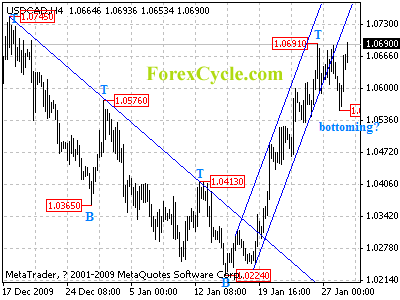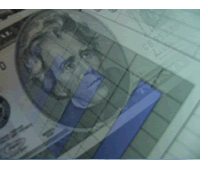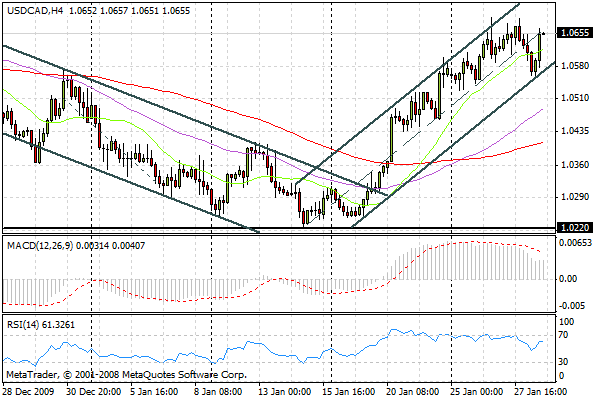Source: ForexYard
The U.S. dollar rose on Thursday to a 6-month high against the EUR as investors around the globe signaled approval of the Federal Reserve’s more upbeat outlook for the U.S. economy. The U.S. currency continues to rally on persistent concerns over the fiscal health in some smaller Euro-Zone countries such as Greece and Portugal.
Economic News
USD – Dollar Weakens vs Yen after Weak U.S. Data
The U.S dollar extended gains on Thursday after the U.S. Labor Department reported that the number of initial jobless claims in the latest week fell 8,000 to 470,000.
Against its Japanese counterpart, the Dollar reversed earlier gains to trade at 89.89 yen, after topping 90 yen earlier and compared to 89.99 yen late Wednesday. The greenback pared its gains versus the Japanese yen after U.S. data showed initial jobless claims fell less than expected last week, while durable goods orders increased less than expected in December.
The U.S. dollar’s gains accelerated against major currencies after the Federal Reserve kept Interest Rates near zero, as expected, but issued a more upbeat assessment of the U.S. economy. Today, the main data focus will be U.S. fourth-quarter gross domestic product (GDP) at 1330 GMT. U.S. GDP may have expanded at a 4.7% pace from October through December, more than double the prior quarter’s growth rate and the strongest since the first three months of 2006.
EUR – EUR Weakens vs. Majors
The EUR fell yesterday to its lowest level in 9 months against the Japanese yen and more than 6 months against the U.S dollar. The single currency dropped to $1.3918, its lowest since mid-July, before edging back to $1.3923, down 0.4% on the day. The EUR also fell as far as 124.81 yen, weakest the EUR/JPY has been since April, to stand 0.6% down on the day.
The 16-nation currency weakened for a 4th day against the greenback after the cost to protect Greek government bonds from default climbed to a record and before a report showed the Euro-zone’s unemployment rate reached an 11-year high. Adding to pressure on the EUR were warnings from credit ratings agencies that Portugal needs to come up with a clear plan of further budget consolidation beyond 2010 to prevent downgrades after this year’s budget plan failed to alleviate concerns.
The EUR may continue to depreciate against the U.S. dollar as Greek bonds and credit-default swaps show investors are beginning to doubt the nation can reduce the biggest budget shortfall in the European Union without assistance from outside.
JPY – Yen Firms as Fall in Stocks Undermines Sentiment
The Japanese yen appreciated yesterday to 89.59 against the U.S dollar today from 90.27, and appreciated to 124.83 per EUR, the strongest level since April 28. A stronger Yen reduces the value of overseas sales for Japanese companies when converted into their native currency.
The Yen gains were trimmed however as dollar buying emerged related to Japanese investment trusts, known as toushin. A fall on Wall Street also undermined investors’ willingness to hold risk positions, with many share markets in Asia also down more than 1 percent.
OIL – Crude Trades Near $74 on U.S. GDP Growth
Crude Oil prices reached $74 a barrel on Friday as investors focused on U.S. Gross Domestic Product data for the 4th quarter that is expected to show strong growth. Prices were slightly lower Thursday after the U.S. dollar rose to its highest level in more than 6-months against the EUR, which fell on concern over potential fiscal crises in European economies including Greece and Portugal. A stronger Dollar often indicates investors are funneling cash away from riskier assets such as commodities. It also can curb demand for crude oil from buyers who hold other currencies, since oil is priced in dollars.
Technical News
EUR/USD
The weekly chart shows the pair moving on a consistent downward sloping trend line. A downward sloping trend line is apparent on the 7-day Relative Strength Indicator and also on the 10-day Momentum Indicator. This shows the downward price movement may have room to run. The pair has passed a 32% retracement level from the previous long term uptrend and now the pair could reach the 50% retracement level which sits at the price of 1.3746. Traders may want to trade with the trend, going short.
GBP/USD
The range trading of the pair continues. The 4-hour chart shows a potential opportunity to enter the market inside the range. The pair fell close to the support level of 1.6109 and has begun to rise. The chart’s Slow Stochastic shows a potential bullish cross has formed, indicating the potential for an upward price appreciation. The chart’s 10-day Relative Strength Indicator has also fallen below the lower limit. Traders may want to wait for the RSI direction to turn up and go long with a target price of 1.6260.
USD/JPY
The weekly chart displays continuing bearish signals with a downward sloping trend line, and a downward sloping MACD histogram. This signals the potential continuation of the downward trend. Also the pair started its last downward move at the upper limit of its Bollinger Bands and has crossed the 20-day moving average. This shows the pair may continue moving lower until it reaches its lower border. The daily chart also shows the pair was unable to break the middle line of its Bollinger Bands, indicating a strong bearish trend. Traders may want to be short on this pair.
USD/CHF
The bullish trend is loosing its steam and the pair seems to consolidate around the 1.0525 level. The daily chart’s RSI is already floating in an overbought territory suggesting that a recent upwards trend is weakening and a bearish correction is impending. Going short with tight stops might be a wise choice.
The Wild Card
Silver
Silver prices are once again dropping and it is currently traded around $13.15 per ounce. And now, the daily chart’s Slow Stochastic is giving bullish signals, indicating that silver prices might go up. This might give forex traders a great opportunity to enter a very popular trend.
Forex Market Analysis provided by Forex Yard.
© 2006 by FxYard Ltd
Disclaimer: Trading Foreign Exchange carries a high level of risk and may not be suitable for all investors. There is a possibility that you could sustain a loss of all of your investment and therefore you should not invest money that you cannot afford to lose. You should be aware of all the risks associated with Foreign Exchange trading.






